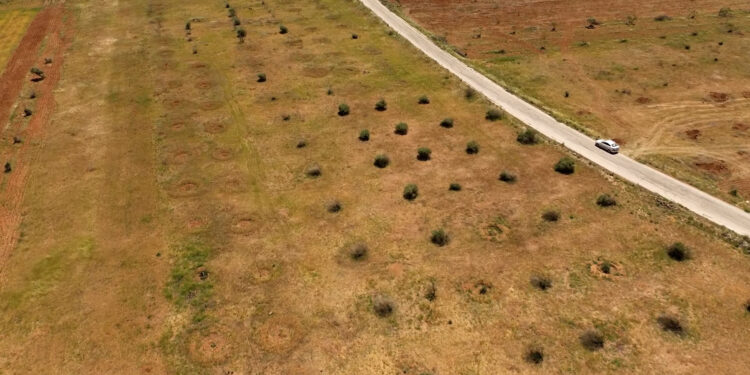“Oh, the joy of what was done”, with this phrase, Hajj Abdel Hamid Al -Fajr describes the condition of his town in the southern Idlib countryside, in northern Syria, after his return to it on November 30 of last year, after its liberation.
The joy of dawn quickly faded due to the change of the features of his town because all of its trees uprooted and most of its homes were demolished.
Fajr had 5 thousand olive trees, which annually generated tons of oil, selling them and living from their goods, and what was overflowing with them was saved to buy new lands and expand his capital.
Upon his return, he was surprised by his lands and turned into a barren land, after all the trees uprooted from their roots by the Assad regime members.
Al -Fajr says in his interview with Al -Jazeera Net: “My village of Hass has not spared one tree, knowing that the number of olive trees in it is estimated at 140 thousand trees.”
He explained that the uprooting process was not limited to his village only, but also extended to dozens of villages and regions from the southern Idlib countryside to the northern Hama countryside and the plain of the jungle.
Al -Fajr notes that about 90% of the population lives on agriculture, especially olives, summer seasons and figs, explaining that most of these trees are more than 100 years old, and that restoring their productivity needs more than 15 years, which is very expensive.
An economic disaster
The uprooting of tens of thousands of fruit trees from their roots – especially olives, figs and pomegranate – formed a severe blow to the agricultural sector in the southern countryside of Idlib, which depends on its economy on salivary agriculture as a main source of income and food.
These trees constituted the backbone of the local economy, and provided a relatively stable income for the people despite the circumstances of the war. As this vegetation was destroyed, the people lost their main source of livelihood, causing high rates of poverty and food insecurity.
tragedy
Yasser Al -Mahmoud, a farmer working in the purchase and sale of agricultural lands, confirms that the population affected by the systematic processes ranges between half a million to a million people.
The number of trees that uprooted from their roots is estimated at hundreds of thousands, while millions of trees are partially cut.
Al -Mahmoud says: “An area between Jabala and Kafr Nabl alone has been uprooted from it about 200,000 olive trees, knowing that 90% of the population of these villages depend on agriculture and selling crops to secure their strength throughout the year.”
He adds that these lands from the southern Idlib countryside to the eastern Idlib countryside, the northern Hama countryside and the plain of the jungle were generated in the seasons of tens of millions of dollars annually from oil, figs, and pistachio products, and issued outside Syria.
Mahmoud stresses that the loss of these perennial trees cannot be compensated quickly, as the new trees need years in order to start production, and he says that the uprootation led to the erosion of soil and increased their fragility in front of erosion factors, which negatively affected the quality of agricultural lands and the weakest productivity of other seasonal crops.
The displacement from the ground to tents
These conditions have prompted many farmers to desert their lands or change the cultivation of rapidly growing crops, but they are less profitable.
In light of the destruction of their homes, many of them resorted to staying in tents, trying to adapt to the new reality, which contributed to the decline in traditional agricultural diversity in the region.
For his part, Muhammad Al -Hammado from the city of Khan Sheikhoun, which is inhabited by about 150,000 people, spoke about his suffering: “I lost my field, which contains about a thousand tree trees, just a week before the liberation of the city, after the officers lost hope in investing the land again.”
In his interview with Al -Jazeera Net, Al -Hammado adds that there are workshops that are brought by contractors who agree with the officers to cut the trees and sell them in the market at low prices, then the returns between the contractor and the officer responsible for the region are shared.
He adds: “The losses of farmers are invaluable, and what happened is a systematic genocide from the army of the former regime, and it may not be compensated until after generations, especially since farmers are still confused about the type of agriculture appropriate for their lands after losing their vegetation.”
Claims of justice and accountability
Residents and farmers called on the new Syrian government to pursue the contractors, officers and workshops that participated in the destruction operations, legally holding them and obtaining compensation within the expected path of transitional justice.
The Syrian human rights jurists, Ahmed Al -Ayman, says: “The government is supposed to form special courts to receive the claims of the affected people, especially the landowners, and to pursue everyone who participated in the operations of cutting and selling, imprisoning them and fining them in exchange for what they committed against the population.”
In his interview with Al -Jazeera Net, he adds that the path of transitional justice must be launched as soon as possible, because the delay in it may open doors to personal revenge, which threatens the civil peace that the government seeks to preserve.
The farmers in the southern Idlib countryside remain awaiting an actual move from the concerned authorities, to stop the drilling of the land and compensate the affected people, at a time when the effects of the war are still chasing them even in their livelihoods, and hinder the dream of full return to their agricultural lives that they knew years.



